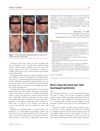 108 citations,
August 2017 in “Clinical, Cosmetic and Investigational Dermatology”
108 citations,
August 2017 in “Clinical, Cosmetic and Investigational Dermatology” Microneedling is promising for treating various skin issues but needs more research to confirm its effectiveness and safety.
 105 citations,
February 2017 in “British Journal of Dermatology”
105 citations,
February 2017 in “British Journal of Dermatology” Survivors of Stevens-Johnson syndrome/toxic epidermal necrolysis need ongoing care for various long-term health problems.
 14 citations,
October 2019 in “International Journal of Women's Health”
14 citations,
October 2019 in “International Journal of Women's Health” Menopausal acne is treated with medications and lifestyle changes, but careful choice is needed due to side effects.
 2 citations,
March 2015 in “Expert opinion on orphan drugs”
2 citations,
March 2015 in “Expert opinion on orphan drugs” New treatments for hair loss show promise but need more research to confirm safety and effectiveness.
 21 citations,
June 2020 in “Dermatologic Therapy”
21 citations,
June 2020 in “Dermatologic Therapy” The COVID-19 pandemic led to fewer dermatology visits and changed the types of skin conditions patients experienced.
 7 citations,
November 2013 in “Pediatrics in Review”
7 citations,
November 2013 in “Pediatrics in Review” Acne is a chronic skin condition not caused by poor hygiene or diet, and it requires long-term treatment and patient education.
 1 citations,
January 2015 in “Journal of Pigmentary Disorders”
1 citations,
January 2015 in “Journal of Pigmentary Disorders” Treating melasma in men is difficult, especially for the deeper skin layers, and may need more than just topical treatments.

Microneedle technology is effective for skin rejuvenation and enhancing cosmeceutical delivery, with ongoing innovation and increasing commercialization.
 5 citations,
February 2013 in “Expert Review of Dermatology”
5 citations,
February 2013 in “Expert Review of Dermatology” New acne treatments include combination creams, advanced retinoids, and light therapies, focusing on safety and patient adherence.

research Acne
4 citations,
January 2019 Acne is a common skin condition that can be influenced by diet, lifestyle, and hormones, and requires a treatment approach that includes psychological considerations.
 2 citations,
October 2016
2 citations,
October 2016 Chemotherapy and radiotherapy can cause skin side effects like rashes, hair loss, and nail changes, which are usually managed with conservative treatments.
 77 citations,
July 2020 in “Journal of the European Academy of Dermatology and Venereology”
77 citations,
July 2020 in “Journal of the European Academy of Dermatology and Venereology” Environmental factors, hormones, nutrition, and stress all significantly affect skin health and aging.
 1 citations,
January 2013 in “Springer eBooks”
1 citations,
January 2013 in “Springer eBooks” Cosmeceuticals may benefit skin health but need more research for efficacy and safety confirmation.
 5 citations,
January 2023 in “Journal of the European Academy of Dermatology and Venereology”
5 citations,
January 2023 in “Journal of the European Academy of Dermatology and Venereology” Experts advise using sunscreen and proper skin care before, during, and after procedures to speed healing, prevent complications, and reduce scarring.
 4 citations,
December 2021 in “Experimental and Therapeutic Medicine”
4 citations,
December 2021 in “Experimental and Therapeutic Medicine” Adult female acne is complex and requires a combination of treatments for effective management.
 February 2024 in “International Journal of Dermatology”
February 2024 in “International Journal of Dermatology” The document concludes that more local research on African skin and hair is needed despite increased scientific output from Sub-Saharan Africa.
November 2023 in “Frontiers in Medicine” The method effectively mimics shaving damage on skin for testing skincare products.
12 citations,
January 2021 in “Journal of Cutaneous and Aesthetic Surgery” Epidermal growth factor helps skin and hair regeneration but needs more research for better understanding.
 1 citations,
January 2021 in “Dermatology online journal”
1 citations,
January 2021 in “Dermatology online journal” A unique case showed a rare combination of two types of lichen planus on the face.
 January 2025 in “Journal of Cosmetic Dermatology”
January 2025 in “Journal of Cosmetic Dermatology” Exosomes may help with hair growth and scar healing, but more research is needed.
36 citations,
December 2014 in “F1000 prime reports” The document concludes that Hidradenitis suppurativa is often underdiagnosed, lacks definitive treatment, and requires better awareness and management strategies.
 February 2024 in “Skin health and disease”
February 2024 in “Skin health and disease” Many popular skincare products claim to prevent aging but lack strong evidence to prove their effectiveness and safety.
 4 citations,
February 2014 in “Journal of the European Academy of Dermatology and Venereology”
4 citations,
February 2014 in “Journal of the European Academy of Dermatology and Venereology” Early diagnosis of hair tourniquet syndrome saved a baby's toe from being lost.
 138 citations,
February 2007 in “European journal of cancer”
138 citations,
February 2007 in “European journal of cancer” EGFR inhibitors often cause skin problems and other side effects, but these are usually reversible and can be managed to keep patients comfortable.
 42 citations,
September 2018 in “Journal der Deutschen Dermatologischen Gesellschaft”
42 citations,
September 2018 in “Journal der Deutschen Dermatologischen Gesellschaft” Adult female acne requires a comprehensive treatment approach, including medical options and lifestyle changes, with attention to psychological well-being.
 17 citations,
May 1987 in “Clinical and Experimental Dermatology”
17 citations,
May 1987 in “Clinical and Experimental Dermatology” A patient with Sézary syndrome showed improvement after treatment and the study suggested follicular mucinosis might indicate future lymphoma risk.
 11 citations,
January 2016 in “Journal of clinical & experimental dermatology research”
11 citations,
January 2016 in “Journal of clinical & experimental dermatology research” Substance abuse can cause various skin problems, including marks from injections, sores, premature aging, and increased cancer risk.
 2 citations,
May 2009 in “Medicine”
2 citations,
May 2009 in “Medicine” Hair and nails can help diagnose diseases, with nail issues often linked to skin conditions and hair loss having various causes and treatments.
 1 citations,
June 2010 in “Expert Review of Dermatology”
1 citations,
June 2010 in “Expert Review of Dermatology” Covers common skin issues in kids, their diagnosis, treatment, and need for specialist care.
 July 2021 in “Journal of dermatology research and therapy”
July 2021 in “Journal of dermatology research and therapy” Using combined treatments can help manage acne by targeting the bacteria and skin changes that cause it.



























